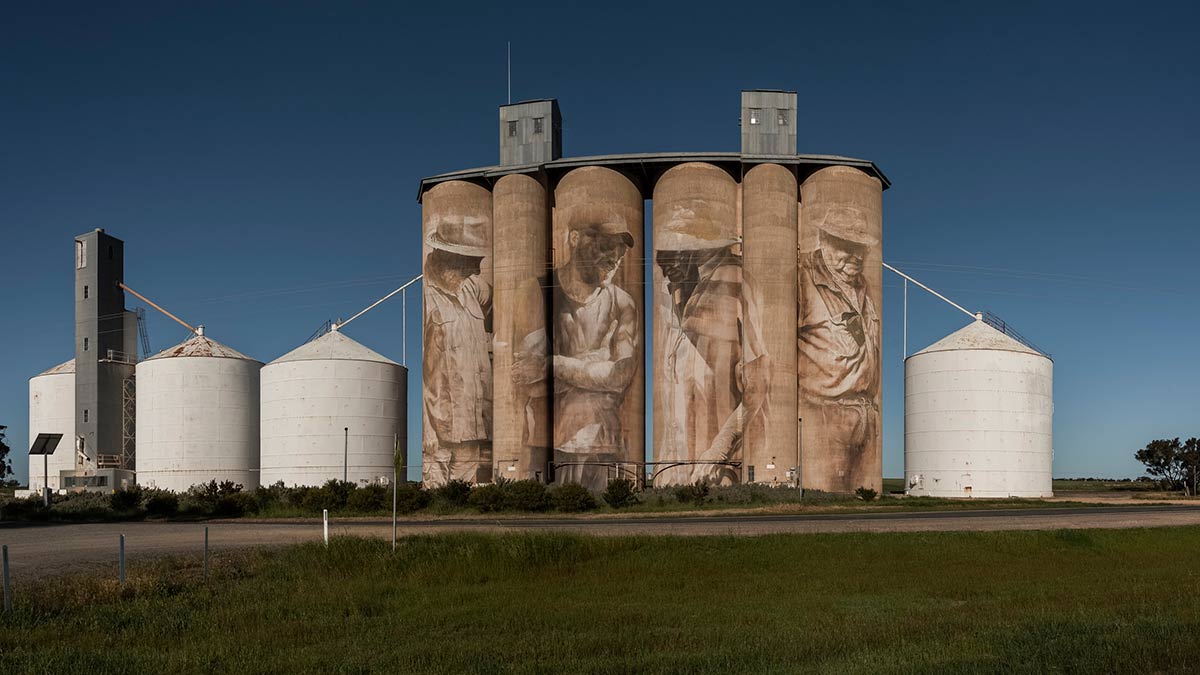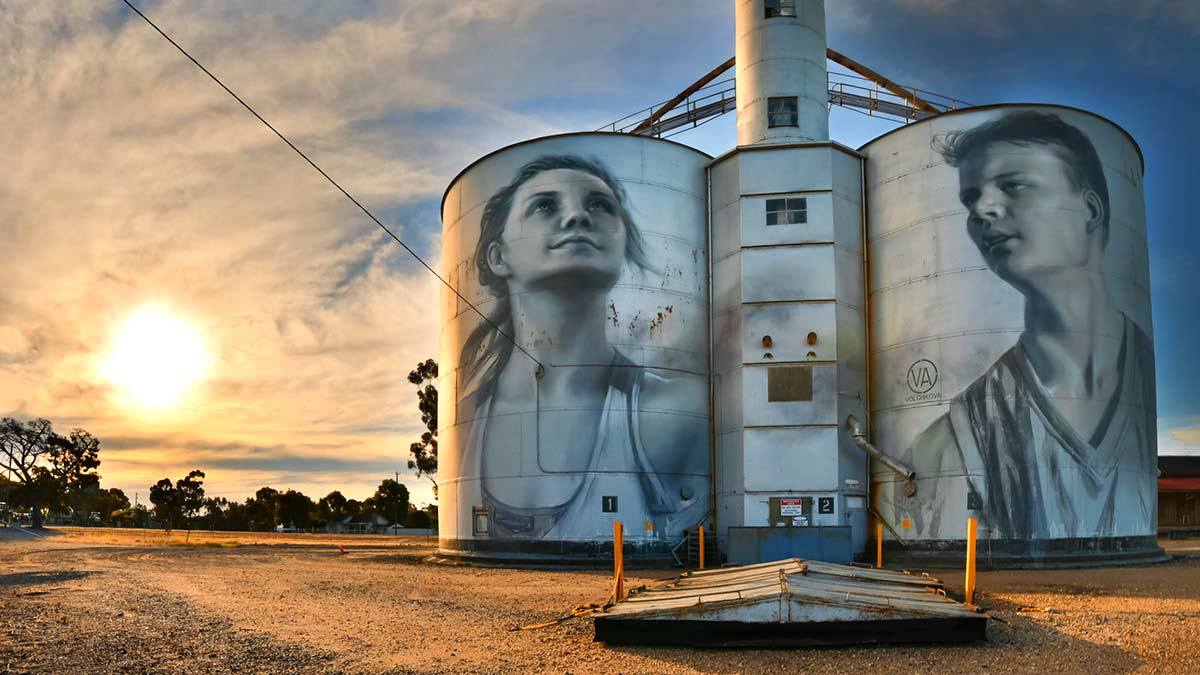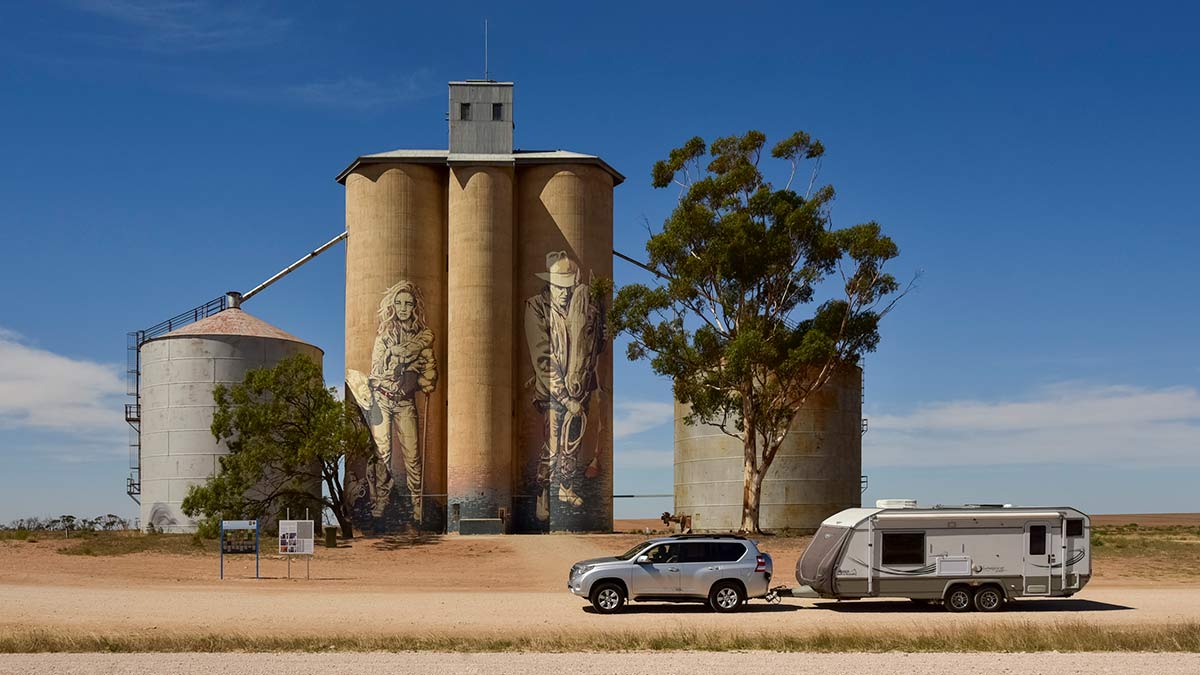Discover Victoria's most haunted places, from eerie mansions and historic hotels to abandoned asylums and old prisons. Explore ghost stories, tours and spooky destinations across Melbourne and regional Victoria.
Victoria's Silo Art Trail: how to explore Australia’s biggest outdoor art gallery

Spanning 700km and featuring works by Rone, Adnate, and other iconic artists, discover Australia’s largest outdoor art gallery on this unique Victorian road trip.
Australia is home to lots of big things: big prawns, big merinos, and big bananas. The location of each big thing often pays homage to the local industries or landscape, and in the case of Victoria's Silo Art Trail – the country’s biggest outdoor art gallery – it's the people and culture of Victoria’s northwest.
The 700km Silo Art Trail loop, which has grown since 2016 to 13 sites featuring giant artworks, has injected new life into the Wimmera Mallee region and gifted Victoria one of the most unique road trip routes in the country.
Follow our guide to the best way to visit Victoria's Silo Art Trail. Make sure your prepared for your road trip before you leave. Check your emergency car kit is packed and your emergency roadside assistance is up to date.
How to visit the Silo Art Trail
There’s no one way to explore the Silo Art Trail, and the route you take can be altered depending on how long you have and what artworks you want to see. The one thing you will need, however, is a vehicle.
If travelling from Melbourne, Bendigo, Ballarat, Geelong or Victoria's east, it’s advised tourists begin with the Rupanyup silo before heading north towards Sheep Hills, Brim and Rosebery. Once you hit Hopetoun, you have the choice to continue north to Patchewollock, west to Albacutya, or east to Lascelles and Sea Lake.
From Melbourne, it's roughly a 3.5 hour drive to Rupanyup, where you can elect to stop at RACV Goldfields Resort in Creswick on your way home.
Alternatively, you can tackle the trail by flying into Mildura, hiring a vehicle, and approaching the trail from the north, beginning with Patchewollock. Those driving from Adelaide can start the trail from Kaniva.

If you don't have time to see all the silos, driving from Rupanyup through to Lascelles lets you encounter five of the main works.
Highlights of the Silo Art Trail
With more than 15 works (and growing), it’s hard to single out just a few silos. There are, however, a few key works you can't miss:
Rupanyup silo art by Julia Volchkova
The Rupanyup silo is the first many tourists will encounter. The silo was created by Russian muralist Julia Volchkova, who was inspired by the town’s youth, and their enthusiasm for team sports in particular.
Like many Victorian towns, Rupanyup has its own football and netball clubs, with Volchkova choosing to portray local sports club members Ebony Baker and Jordan Weidemann on the silos.
Brim silo art by Guido van Helten
This huge mural by photorealistic street artist Guido van Helten and Juddy Roller was the artwork that started the entire Silo Art Trail. The work was completed in 2016, and soon after brought international attention to the small town of Brim (which has a population of 181 people).
The mural depicts four fictional farmers that represent the resilient farming community of the Wimmera region. It was also nominated for the 2016 Sulman Art Prize, which is Australia’s leading genre, subject or mural painting prize delivered alongside the Archibald Prize by the Art Gallery of NSW.
Lascelles silo art by Rone
Victorian street artist Rone, known for his large-scale installations in abandoned and decaying buildings, chose to depict two Lascelles locals in his silo artwork. Farming couple Geoff and Merrilyn Horman, who have lived in the area for four generations, are the subjects of the huge mural, which has been created on silos that date back to 1939.
Rone’s signature washed-out style of painting makes the portraits look as if they’ve organically risen out of the silo’s concrete walls.
Rosebery silo art by Kaff-eine
Melbourne street artist Kaff-eine assisted with Rone’s silo work in Lascelles, which was an opportunity for her to learn more about the Wimmera-Mallee region.
She took this knowledge and created her own silo artwork in Rosebery, painting a mural portraying the region’s past, present and future. On the left, her female farmer is a nod to the many women who work the land in the region and their tenacity against nature. The portrait on the right, captures a tender moment between a man and his horse, with the man wearing clothing common to the area such as an Akubra and oilskin vest.
Sheep Hills silo art by Adnate
Adnate is no stranger to painting huge murals, having created the southern hemisphere’s tallest street artwork on a Collingwood public housing tower in 2018. His silo artwork in Sheep Hills is the result of his friendship with the Barengi Gadjin Land Council, and the four weeks he spent getting to know this community.
The mural portrays Wergaia Elder, Uncle Ron Marks, and Wotjobaluk Elder, Aunty Regina Hood alongside two children, Savannah Marks and Curtly McDonald, in a work that speaks to the local dreaming as well as the passing of ancestral knowledge between generations.






